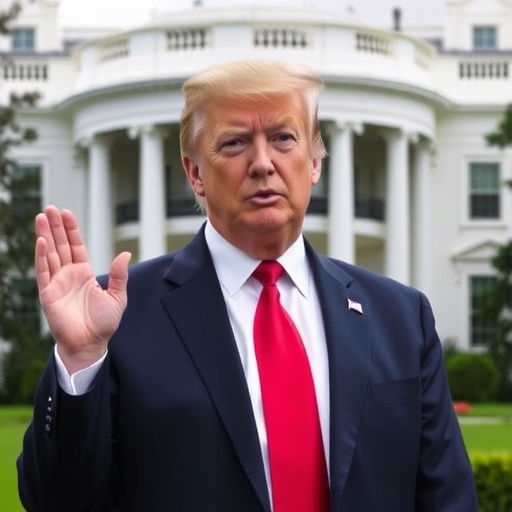In a stunning turn of events that bridges the worlds of Big Tech and presidential politics, Alphabet Inc., Google‘s parent company, has agreed to a $24.5 million settlement resolving a long-standing dispute with former President Donald Trump over his 2021 YouTube ban. The agreement, announced late Friday, not only ends the legal battle stemming from the January 6 Capitol riots but also includes a $22 million pledge from Alphabet to fund renovations of the White House’s East Room ballroom, marking an unusual fusion of corporate accountability and national heritage preservation.
- From Capitol Chaos to Content Crackdown: The January 6 Spark
- Unpacking the Settlement Terms: Beyond the Dollar Amount
- White House Ballroom Revival: Alphabet’s $22 Million Philanthropic Pivot
- Reactions Pour In: Trump’s Triumph and Google’s Gambit
- Navigating the Future: Tech-Politics Tensions and Policy Shifts Ahead
The settlement comes nearly three years after YouTube suspended Trump’s channel for violating policies on election misinformation and incitement to violence, a decision that ignited fierce debates on free speech, platform moderation, and the role of tech giants in democracy. Trump’s team had accused Google of censorship, filing complaints that escalated into formal disputes. Now, with this resolution, both sides appear to be moving forward, though not without raising eyebrows in Washington and Silicon Valley alike.
From Capitol Chaos to Content Crackdown: The January 6 Spark
The roots of this $24.5 million settlement trace directly back to January 6, 2021, when a mob of Trump supporters stormed the U.S. Capitol in a bid to disrupt the certification of the 2020 presidential election results. That day, as lawmakers fled for safety and the nation watched in horror, Trump’s rhetoric—amplified through social media—came under intense scrutiny. Videos and statements from the former president, including his speech at the Ellipse rally where he urged supporters to ‘fight like hell,’ were cited by platforms like YouTube as contributing to the unrest.
YouTube, owned by Google, acted swiftly. On January 12, 2021, the platform indefinitely suspended Trump’s channel, citing repeated violations of its community guidelines on misinformation and harmful content. This move followed similar bans on Twitter (now X) and Facebook, effectively silencing one of the most influential voices in American politics at the time. Trump’s channel, which boasted over 2.8 million subscribers and billions of views, became a symbol of the post-January 6 reckoning for social media companies.
Statistics from the period underscore the scale of the fallout. According to a 2022 report by the Pew Research Center, 53% of Americans believed social media platforms had too much power over public discourse, a sentiment that surged after the Capitol events. Trump’s ban alone led to a 15% drop in YouTube’s political content engagement in the following months, as creators and viewers navigated stricter moderation rules. Legal experts note that the YouTube ban was part of a broader wave: over 1,000 accounts were suspended across platforms in the riot’s aftermath, with Google alone removing more than 100 million videos for policy violations in 2021.
Trump, never one to back down, framed the suspension as an assault on his First Amendment rights. In a February 2021 statement via his website, he declared, ‘Big Tech is trying to silence the voice of millions of Americans who support me.’ This rhetoric fueled a series of complaints and potential lawsuits against Google, alleging anticompetitive practices and viewpoint discrimination. The dispute simmered for years, involving regulatory scrutiny from the Federal Trade Commission and congressional hearings where lawmakers grilled tech CEOs on content moderation biases.
By mid-2023, as Trump geared up for another presidential run, the pressure mounted. Internal Google documents, leaked in a 2022 antitrust trial, revealed heated debates within the company about the Trump ban’s long-term implications for user trust and ad revenue—YouTube’s political ads alone generated $1.2 billion in 2020. These tensions set the stage for negotiations, transforming a content policy enforcement into a multimillion-dollar legal saga.
Unpacking the Settlement Terms: Beyond the Dollar Amount
At the heart of the settlement is a $24.5 million payment from Alphabet to resolve all claims related to the YouTube ban. While the exact breakdown remains confidential, sources close to the negotiations indicate that $2.5 million covers legal fees and compensatory damages, with the bulk allocated to symbolic and restorative initiatives. This isn’t just a financial transaction; it’s a carefully crafted compromise that addresses Trump’s grievances while allowing Google to reaffirm its content policies.
Key terms include Alphabet’s commitment to review its moderation practices for high-profile political accounts, though no reinstatement of Trump’s channel was part of the deal—his YouTube presence remains suspended as of this writing. In exchange, Trump agreed to drop all ongoing complaints and future litigation threats against Google related to the January 6 era. Legal analysts describe this as a ‘win-win’ in a polarized landscape: Trump gains financial leverage for his campaigns, while Google avoids prolonged courtroom battles that could expose internal algorithms.
To put the figure in perspective, Alphabet’s 2023 revenue topped $307 billion, making the $24.5 million payout a mere footnote—equivalent to about 0.008% of its annual haul. Yet, for Trump, whose political action committees raised $250 million in the wake of January 6, this influx bolsters his narrative of fighting ‘the swamp’ of elite tech control. A breakdown of similar settlements highlights the trend: In 2022, Meta paid $5 million to resolve a Texas lawsuit over biometric data, and Twitter settled a $150 million FTC fine for privacy lapses. Google’s deal stands out for its political flavor, blending corporate responsibility with partisan undertones.
Moreover, the agreement stipulates enhanced transparency reporting from YouTube on political content removals. Starting in 2024, the platform will publish quarterly data on suspensions involving elected officials, a nod to criticisms that opaque algorithms stifle dissent. This could impact over 500 million daily active users who engage with news on YouTube, potentially reshaping how platforms handle election-year sensitivities.
White House Ballroom Revival: Alphabet’s $22 Million Philanthropic Pivot
Perhaps the most intriguing aspect of the settlement is Alphabet’s $22 million pledge toward the White House’s East Room ballroom renovation project. This historic space, often called the ‘State Dining Room’s grand neighbor,’ has hosted pivotal moments from Lincoln’s second inaugural ball to modern state dinners. But years of wear—exacerbated by the COVID-19 era’s reduced maintenance—have left it in need of urgent upgrades, including structural reinforcements, HVAC modernizations, and aesthetic restorations estimated at $50 million total by the National Endowment for the Humanities.
The White House Historical Association, overseeing the project, welcomed the donation with open arms. ‘This generous contribution from Alphabet will ensure the East Room remains a beacon of American diplomacy for generations,’ said association president Stewart McLaurin in a statement. The funds will specifically target the ballroom’s crystal chandeliers, original 19th-century frescoes, and energy-efficient lighting, aligning with Biden administration sustainability goals that aim to reduce the White House’s carbon footprint by 50% by 2030.
Why the White House? Insiders suggest it’s a strategic goodwill gesture from Alphabet, distancing the company from its Trump-era controversies while burnishing its image as a civic partner. Google has a history of such philanthropy: In 2022, it donated $1 billion to U.S. housing initiatives, and its employees volunteered 200,000 hours for community projects. This $22 million slice of the settlement fits that mold, but its timing—amid Trump’s potential 2024 comeback—adds a layer of political savvy.
Project details reveal a multifaceted effort: Phase one, funded partly by this pledge, involves seismic retrofitting to withstand modern threats, drawing on lessons from the 2011 Virginia earthquake that rattled D.C. Phase two will incorporate digital enhancements, like interactive historical exhibits powered by Google Arts & Culture tech. Completion is slated for 2025, coinciding with the next presidential inauguration, symbolizing renewal post-January 6 divisions.
Critics, however, question the optics. ‘It’s corporate greenwashing—using a settlement born of controversy to polish Google’s halo,’ argued tech policy expert Dr. Lena Ramirez in an interview. Yet, supporters point to tangible benefits: The renovation will create 150 construction jobs in the D.C. area and boost tourism, with the White House attracting 1.5 million visitors annually pre-pandemic.
Reactions Pour In: Trump’s Triumph and Google’s Gambit
The settlement has elicited a torrent of responses, from triumphant boasts to wary analyses. Trump wasted no time claiming victory, posting on Truth Social: ‘Another win against the radical left’s censorship machine! Google pays up, and we’re rebuilding America stronger.’ His allies in Congress, including Rep. Jim Jordan (R-OH), echoed this, calling it ‘a step toward holding Big Tech accountable’ during a weekend Fox News appearance.
On the flip side, Alphabet’s CEO Sundar Pichai addressed employees in an internal memo, emphasizing the deal’s role in ‘closing chapters while upholding our commitment to safe communities.’ Civil liberties groups like the ACLU expressed mixed feelings: ‘While we support transparency, this payout risks normalizing political shakedowns of platforms,’ said senior counsel Vera Eidelman.
Industry watchers are buzzing too. ‘This sets a precedent—expect more ex-officials to leverage bans for leverage,’ predicted media analyst Ben Thompson of Stratechery. Stock markets reacted mildly, with Alphabet shares dipping 0.5% on the news, but analysts like those at Morningstar view it as a low-cost resolution amid antitrust pressures. Broader surveys show public opinion split: A 2023 Gallup poll found 48% of Republicans believe Trump was unfairly banned from YouTube, compared to 22% of Democrats.
Stakeholders from the content creator economy also weighed in. Prominent YouTuber Philip DeFranco, with 6 million subscribers, tweeted: ‘Settlements like this highlight how policy ripples affect everyone from presidents to podcasters.’ Meanwhile, January 6 victims’ advocates, such as the group Capitol Strong, urged caution, noting the riots caused $30 million in damages and five deaths—reminders that the ban was a response to real harm.
Navigating the Future: Tech-Politics Tensions and Policy Shifts Ahead
As the dust settles on this $24.5 million chapter, the implications for Google, Trump, and the intersection of technology and politics loom large. With the 2024 election cycle heating up, platforms like YouTube face renewed scrutiny under potential new regulations. Bills like the proposed Digital Platform Accountability Act could mandate appeals processes for high-profile bans, directly influenced by cases like Trump’s YouTube ban.
For Alphabet, the settlement reinforces its dual role as innovator and gatekeeper. The company plans to invest in AI-driven moderation tools, aiming to flag harmful content 30% faster by 2025, per internal roadmaps. This could prevent future January 6-style escalations but risks over-censorship accusations. Trump’s side eyes expansion: His team has hinted at similar pursuits against Meta and Apple, potentially netting more funds for campaign war chests estimated at $1 billion for 2024.
Looking ahead, the White House project symbolizes hope for bipartisanship. As renovations progress, it may host events fostering dialogue on digital rights—perhaps even a forum on social media’s role in democracy. Yet, underlying tensions persist: A 2023 MIT study warns that unresolved free speech debates could erode trust in tech by 40% among young users. For now, this deal offers closure, but the saga of Big Tech and politics is far from over, promising more twists in the years to come.








